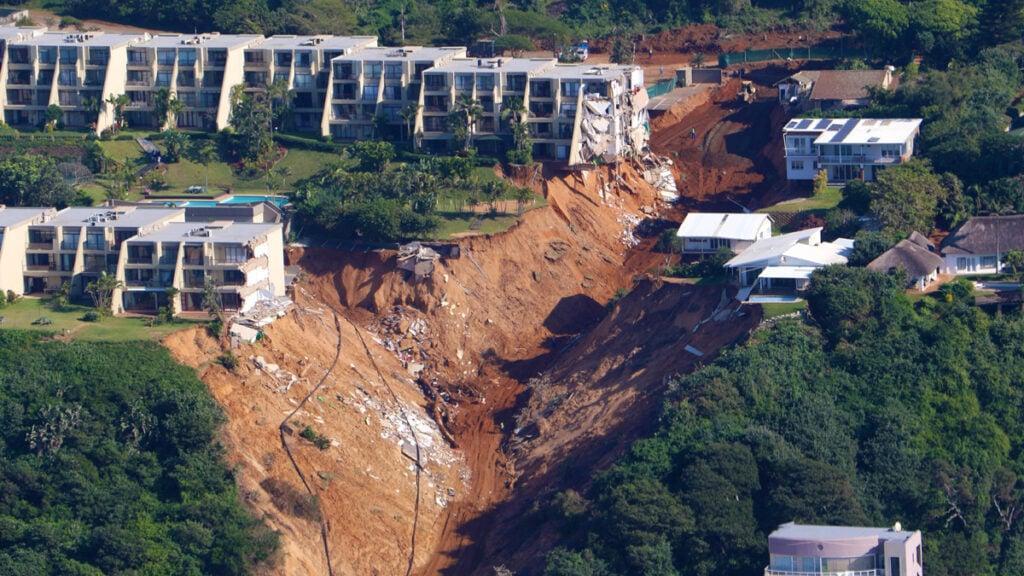Africa-Press – South-Africa. South Africa’s financial sector is increasingly vulnerable to climate-related shocks, with the rise in extreme weather events putting insurers and banks under increasing pressure.
These risks come in various forms, including increased payouts to clients, higher premiums, and increased collateral requirements for lending.
This risk has been exacerbated by the country’s deteriorating infrastructure, which is significantly less resilient to extreme weather events than it was just a decade ago.
Most notably, this has resulted in Toyota South Africa Motors’ Japanese insurers suing Transnet and the KwaZulu-Natal Department of Transport for R6.5 billion in damages sustained to its Prospecton factory during the 2022 floods.
It alleges that the floods, which closed the Prospecton plant for four months, cost the company about R4.5 billion in plant repairs and rehabilitation and more than R2 billion in business interruption.
The suit alleges that by failing to maintain waterways and drainage systems that carried the floodwater, the three defendants shared responsibility for the damage.
South Africa’s Reserve Bank warned in its latest Financial Stability Review that these extreme weather events pose an elevated risk to the country’s financial system.
It explained that climate change poses two primary risks to the financial sector – physical and transition risks, which affect institutions in various ways.
Physical risks primarily involve economic losses resulting from more frequent and intense weather events that damage property or harm individuals, typically leading to increased insurance claims.
Transition risks, on the other hand, are driven by the lack of a coordinated response to climate change and the inaction or inability of financial institutions to prepare for future risks.
As countries transition at varying paces, the risk of a disorderly shift to a low-carbon economy intensifies.
These risks particularly threaten to impact banks, with traditional forms of collateral having to be repriced or discarded in favour of other forms.
As a result of these increasing risks, South African financial institutions may be less likely to extend credit to certain industries and households based on their exposure to climate change and the transition to a low-carbon economy.
South Africa’s insurance gap
A more concerning impact of climate change is the significant insurance gap in South Africa, created by the need for insurers to increase premiums to match the rising cost of coverage and the increasing cost of reinsurance.
The Reserve Bank stated that this is a growing area of focus, as it has the potential to significantly impact South Africa’s financial system due to its global exposure.
The insurance gap refers to the uninsured portion of economic losses arising from climate-related shocks, and it is expected to widen as the risks associated with climate change increase.
A related issue is the growing issue of uninsurable risks, which are risks that insurance companies explicitly exclude from available insurance coverage.
This is predominantly due to the rising cost of coverage in areas plagued by extreme weather, making it economically unviable for insurers to offer traditional products.
It is also driven by the rising cost of reinsurance, with reinsurers being unwilling to take on the risk associated with specific events.
With the increased frequency of extreme weather events, insurers are unable to lean on reinsurers to smooth out the impact over time.
This is not a phenomenon unique to South Africa. Globally, severe weather is impacting the sustainability of the insurance industry in new and unexpected ways.
While the country used to be a catastrophic event free zone, the scale and frequency of flooding, fires, and droughts have resulted in a significant shift.
The Reserve Bank said it is currently exploring methodologies to determine the climate insurance protection gap in South Africa and how it can be addressed.
While preliminary research to assess the impact of certain transition risks for the South African banking sector has been completed, more work is required to understand the compounding of both physical and transition risks, it said.
This would cover all financial institutions and certain non-financial sectors such as government, households and non-financial corporates.
For More News And Analysis About South-Africa Follow Africa-Press






